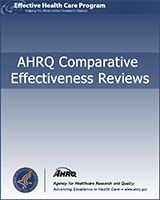See 2016 update of this review.
Comparative Effectiveness and Safety of Oral Diabetes Medications for Adults With Type 2 Diabetes
Comparative Effectiveness Reviews, No. 8
Authors
Investigators: Shari Bolen, MD, MPH, Lisa Wilson, ScM, Jason Vassy, MPH, Leonard Feldman, MD, Jessica Yeh, PhD, Spyridon Marinopoulos, MD, MBA, Renee Wilson, MSc, David Cheng, Crystal Wiley, MD, Elizabeth Selvin, PhD, MPH, David Malaka, MBBS, MPH, Charity Akpala, MBBS, MPH, Fred Brancati, MD, MHS, and Eric Bass, MD, MPH.Affiliations
Excerpt
We have performed a systematic review of published studies on the comparative effectiveness and safety of all oral diabetes medications. By comparing the short-term and long-term clinical effects of these medications, clinicians may have a better sense of how to choose among the oral diabetes medications. This review should be helpful as new classes of oral diabetes medications come on the market, such as the dipeptidyl peptidase-IV (DPP-IV) inhibitors. In addition, the results presented here may provide policymakers and insurers with better insight as they consider policies relating to medication coverage.
Suggested citation:
Bolen S, Wilson L, Vassy J, Feldman L, Yeh J, Marinopoulos S, Wilson R, Cheng D, Wiley C, Selvin E, Malaka D, Akpala C, Brancati F, Bass E. Comparative Effectiveness and Safety of Oral Diabetes Medications for Adults With Type 2 Diabetes. Comparative Effectiveness Review No. 8. (Prepared by Johns Hopkins Evidence-based Practice Center under Contract No. 290-02-0018.) Rockville, MD: Agency for Healthcare Research and Quality. July 2007. Available at: http://effectivehealthcare.ahrq.gov/healthInfo.cfm?infotype=all&reptype=allfinal.
This report is based on research conducted by The Johns Hopkins University Evidence-based Practice Center (EPC) under contract to the Agency for Healthcare Research and Quality (AHRQ), Rockville, MD (Contract No. 290-02-0018). The findings and conclusions in this document are those of the author(s), who are responsible for its contents; the findings and conclusions do not necessarily represent the views of AHRQ. Therefore, no statement in this report should be construed as an official position of the Agency for Healthcare Research and Quality or of the U.S. Department of Health and Human Services.
This report is intended as a reference and not as a substitute for clinical judgment. Anyone who makes decisions concerning the provision of clinical care should consider this report in the same way as any medical reference and in conjunction with all other pertinent information.
This report may be used, in whole or in part, as the basis for development of clinical practice guidelines and other quality enhancement tools, or as a basis for reimbursement and coverage policies. AHRQ or U.S. Department of Health and Human Services endorsement of such derivative products may not be stated or implied.
None of the investigators has any affiliations or financial involvement that conflicts with the material presented in this report.
- 1
540 Gaither Road, Rockville, MD 20850. www
.ahrq.gov
